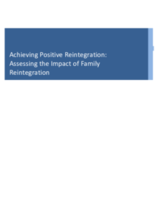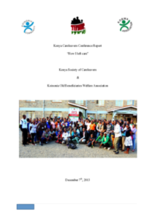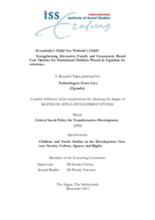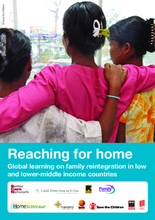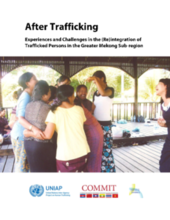Displaying 891 - 900 of 991
This study investigates the impact of reintegration of children from five transitional shelters into their families in Cambodia, and explores key factors (such as consistent and regular follow-up), that contribute to positive, stable outcomes for them.
The aim of this article is to examine unaccompanied minors’ experiences of leaving care in Sweden, and to explore the experience in relation to perceptions about ethnicity and culture within a transnational space.
Koinonia Old Beneficiaries Welfare Association and Kenya Society of Careleavers report on their annual Careleavers Conference that took place on December 7th, 2013 at the Shalom House, Dagoretti Corner.
The study examined alternative family and community care options and how they can be strengthened; cultural attitudes and perceptions of the communities and experiences of prospective foster and adoptive parents as regards reunification, kinship care, fostering and adoption.
This inter-agency, desk-based research aims to arrive at a clearer understanding of reintegration practices for separated children in low and lower-middle income countries. The research pulls together learning from practitioners and academics working with a range of separated children, such as those torn from their families by emergencies, children who have been trafficked or migrated for work, and children living in institutions or on the streets.
This study compares the data on young people transitioning from out of home care from 9 non-communist European countries examined in the INTRAC document with 14 post-communist countries reviewed in the SOS and INTRAC publications.
This study, coordinated by the United Nations Inter-agency Project on Human Trafficking, draws findings from in-depth interviews with 252 trafficked persons about their experiences of (re)integration, including successes and challenges, as well as future plans and aspirations.
The aim of this study was to explore the experiences of residential care from the perspectives of a group of young people who had lived in residential childcare institutions in Bangladesh with a view to making improvements in residential childcare in the future.
Oxford Policy Management has conducted two rounds of qualitative evaluations of three poverty-reduction and human development programmes run by the BOTA Foundation in Kazakhstan: the Conditional Cash Transfer (CCT) Programme, the Social Services Programme and the Tuition Assistance Programme. Each report produced by Oxford Policy Management includes a description of the methodology and results of the fieldwork as well as conclusions and recommendations.
In this TED talk, Lemn Sissay recalls his experiences of the care system, the search for his birth family and the insights this has given him.

